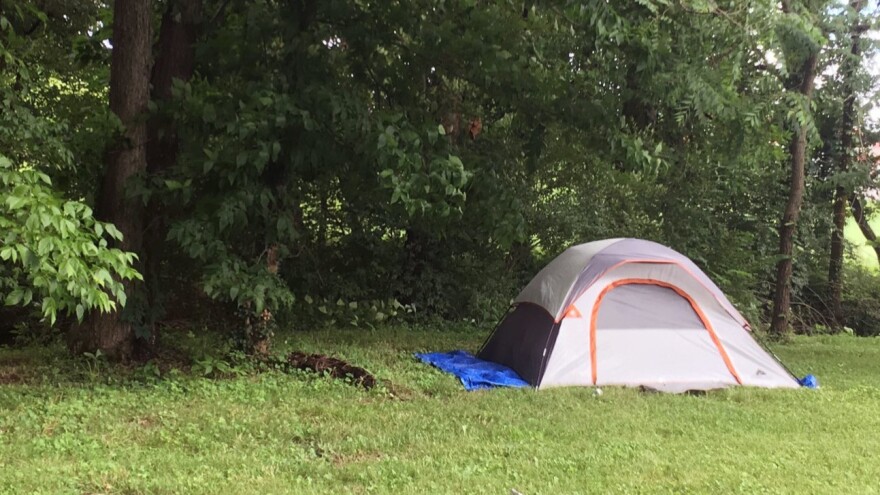ALLENTOWN, Pa. — An imminent ruling by the U.S. Supreme Court could provide new impetus for a Homeless Bill of Rights in Allentown.
But an Allentown City Council committee on Wednesday night forwarded the measure to the full body without recommending its passage.
The Supreme Court is considering a case about whether municipalities can punish people for living outside if shelters are full or unavailable. The case centers on Grants Pass, Oregon, which cites people who are found sleeping outside.
The city’s municipal code prohibits sleeping on public sidewalks, streets, alleys and park benches.
“I needed my car to get to work, so I prioritized getting a tire over paying rent. Next thing you know, I'm sleeping in that car. That kind of stuff happens every single day.”Allentown City Councilwoman Ce-Ce Gerlach on losing her housing in 2009
The code also bans “campsites,” which it defines as any place with bedding or a stove or fire used as a temporary place to live. Campsites include tents, lean-tos, shacks and vehicles under the Grants Pass municipal code.
Violations come with a $295 ticket that climbs to $500 if it’s unpaid. People can face trespass charges and jail time after two violations, according to the city’s code.
A group of homeless people in 2018 filed a class action lawsuit against the Oregon city over that ban, a challenge that’s made its way to the highest court in the country.
They say the municipal code violates the U.S. Constitution’s Eighth Amendment’s guarantees against cruel and unusual punishment and excessive fines by punishing them for living in the city.
Supreme Court experts expect justices to issue their ruling by the end of June.
'One step away from homelessness'
Allentown City Councilwoman Ce-Ce Gerlach joined hundreds in April at a protest outside the Supreme Court.
“This is really personal for me,” Gerlach said.
A third-term city lawmaker, she said she slept in her car for about six months in 2009 after getting a flat tire.
“I needed my car to get to work, so I prioritized getting a tire over paying rent,” Gerlach said. “Next thing you know, I'm sleeping in that car. That kind of stuff happens every single day.”
Many Allentown residents “are living paycheck to paycheck,” Gerlach said.
“We're all just … one step away from homelessness,” she said.
The Supreme Court would “criminalize homelessness” by letting officials in the Oregon city continue issuing heavy fines to people sleeping outside — fines that could lead to jail time if they go unpaid, Gerlach said.
“If you are not providing them any place to go, how could you possibly fine them for being outside?"Abigail Goldfarb, chair of Allentown's Commission on Homelessness
Abigail Goldfarb, executive director of the Lehigh Conference of Churches and chairwoman of Allentown’s Commission on Homelessness, agreed with Gerlach’s characterization of the potential repercussions of the Supreme Court’s ruling.
“That’s exactly how I see it,” Goldfarb said.
“If you are not providing them any place to go, how could you possibly fine them for being outside?” she said.
“If we're not going to meet the [need for housing] by providing enough shelter space for people to stay in, and we're not going to work fast enough to figure out places that are affordable for those living on a Social Security income or disability income, then how can we punish them?”
‘A distraction’?
The Commission on Homelessness spent much of the past year drafting an Unsheltered Declaration of Rights that council considered for the first time this week.
That declaration lists a dozen rights afforded to all people under the U.S. Constitution but reaffirms those rights for unsheltered people.
“I am treated like garbage because I am homeless. We're getting chased everywhere we go. They’re stopping us to ask us for ID and look at our bags for no reason.”Vanessa Fletcher on her interactions with Allentown police
Those include the right to housing, employment fairness, medical care, personal property and privacy, education and the “right to sit, rest or sleep in temporary shelter.”
Allentown City Councilman Santo Napoli expressed concerns about “gray areas” and ambiguity in some parts of the proposed measure, while Councilman Daryl Hendricks urged his colleagues to vote against it.
“I personally fail to understand why we need such a bill over and above that which is currently afforded to all individuals under the Constitution of the United States,” Hendricks said.
“What’s next week? Are we going to do it for mail people, mail carriers or whatever?”
Allentown Mayor Matt Tuerk questioned the value of council approving a Homeless Bill of Rights.
“Coming up with solutions is more important,” he told LehighValleyNews.com.
“I find things like Homeless Bills of Rights a bit of a distraction when the real challenge is: how do we create more housing?”
The mayor said he’s urged the Commission on Homelessness to “focus on a data-driven strategy to address the challenges that we face in Allentown with regards to producing housing for our people."
‘Treated like garbage because I’m homeless’
A stream of residents spoke Wednesday in support of the proposed Unsheltered Declaration of Rights, including several who said they don't have a permanent place to sleep every night.
“We have no rights. We are treated differently from … people that work and own a home,” Vanessa Fletcher told city council members.
Fletcher said she lost her housing when her boyfriend died and accused Allentown police of “violating our rights.”
Homeless people are “not criminals; we’re not dirty.”Vanessa Fletcher, who identified herself as unsheltered
“I am treated like garbage because I am homeless,” she said. “We're getting chased everywhere we go. They’re stopping us to ask us for ID and look at our bags for no reason.”
Homeless people are “not criminals; we’re not dirty,” Fletcher said, crediting organizations that help people such as her in Allentown.
Fletcher’s comments earned a round of applause from other residents in the room, who were admonished by City Council President Cynthia Mota for their show of support.
A recent point-in-time count by the Pennsylvania Continuums of Care showed a significant increase in the number of unsheltered people in the eastern part of the state since last year.
Just under 500 people in that region were counted as unsheltered in 2024, a 71% increase since 2023’s point-in-time count.
A similar count in the Lehigh Valley documented 212 unsheltered people this year, 101 more than last, according to the statistics.
Allentown’s problem with homelessness is more apparent each summer after the Allentown YMCA shuts down its Warming Station. Many end up back the streets with no other place to stay.
The shelter is open every night from mid-November through mid-April.
Members of City Council’s committee on rules, chambers, intergovernmental relations and strategy sent the Unsheltered Declaration of Rights to the full body, which could bring up the measure at its June 26 meeting.


